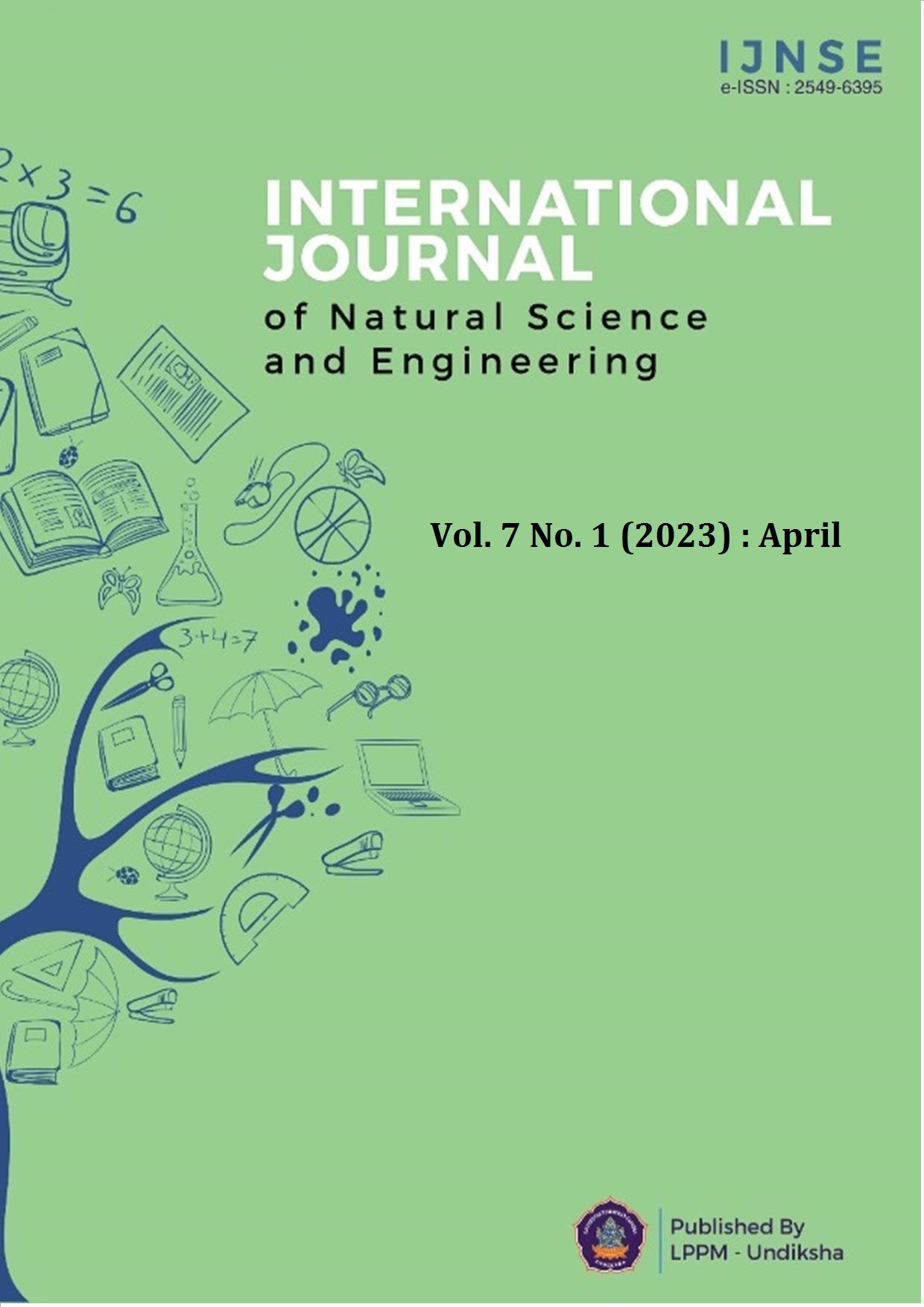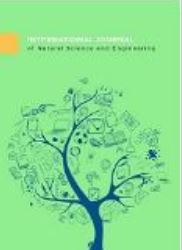Utilization of Snapper Spinach Leaf Extract (Amaranthus Hybidrus L) in Peel-Off Gel Mask Preparation for Aging Face Skin Care
DOI:
https://doi.org/10.23887/ijnse.v7i1.57767Kata Kunci:
Utilization, snapper spinach leaf extract, peel off gel mask, skin aging skincareAbstrak
The peel-off gel mask is a type of mask that is easy and practical to use. Besides that, it can also hydrate the skin well. Spinach contains chemicals that are good for skin health including vitamin A, vitamin E, vitamin C, and flavonoids. The purpose is to determine the feasibility of peel-off gel masks with snapper spinach leaf extract in terms of laboratory tests (vitamin A, vitamin C, flavonoids, homogeneity, pH, drying time), organoleptic tests (color, aroma, stickiness, and texture), and hedonic test (favourability level). This type of research is an experiment with quantitative analysis. The independent variable is snapper spinach leaves. The dependent variable is the content of vitamin A, vitamin C, flavonoids, homogeneity, pH, and drying time contained in the peel-off gel mask. Data analysis techniques are observation and documentation. The formulations used are X1 (1%), X2 (3%), and X3 (5%). The results showed that in the peel-off gel mask of spinach leaf extract, there was 9568,0000 ppm (9.57%) of vitamin A, 0.088% vitamin C, (+) flavonoids, the X1 and X2 formulations were homogeneous, while the X3 formulation not homogeneous, pH 4.86, and average drying time of 20 minutes. The best formulation in terms of organoleptic and hedonic tests is X2 (3%) quite colorful (55.56%), quite flavourful (66.67%), sticky (66.67%), smooth (100%), likes (66,67%). Thus, the peel-off gel mask with snapper spinach leaf extract is suitable as an aging skin treatment.
Referensi
AF, S. M., Widodo, W., & Widyarti, S. (2016). Formulasi Masker Alami Berbahan Dasar Bengkoang dan Jintan Hitam Untuk Mengurangi Kerutan pada Kulit Wajah. Care: Jurnal Ilmiah Ilmu Kesehatan, 4(2), 22–35. https://doi.org/10.33366/jc.v4i2.466.
Afonso, C. R., Hirano, R. S., Gaspar, A. L., Chagas, E. G. L., Carvalho, R. A., Silva, F. V., & Yoshida, C. M. P. (2019). Biodegradable antioxidant chitosan films useful as an anti-aging skin mask. International Journal of Biological Macromolecules, 132, 1262–1273. https://doi.org/10.1016/j.ijbiomac.2019.04.052. DOI: https://doi.org/10.1016/j.ijbiomac.2019.04.052
Aguirre-Cruz, G., León-López, A., Cruz-Gómez, V., Jiménez-Alvarado, R., & Aguirre-Álvarez, G. (2020). Collagen hydrolysates for skin protection: Oral administration and topical formulation. Antioxidants, 9(2), 181. https://doi.org/10.3390/antiox9020181. DOI: https://doi.org/10.3390/antiox9020181
Ahmed, I. A., Mikail, M. A., Zamakshshari, N., & Abdullah, A. (2020). Natural anti-aging skincare: role and potential. Biogerontology, 21, 293–310. https://doi.org/10.1007/s10522-020-09865-z. DOI: https://doi.org/10.1007/s10522-020-09865-z
Akbari, B., Baghaei‐Yazdi, N., Bahmaie, M., & Mahdavi Abhari, F. (2022). The role of plant‐derived natural antioxidants in reduction of oxidative stress. BioFactors, 48(3), 611–633. https://doi.org/10.1002/biof.1831. DOI: https://doi.org/10.1002/biof.1831
Antara, I. P. S., Megawati, F., & Dewi, N. L. K. A. A. (2022). Review Artikel: Trend Pemilihan Sediaan Kosmetik Herbal pada Kulit Wajah. Usadha, 2(1), 43–50. https://doi.org/10.36733/usadha.v2i1.5661. DOI: https://doi.org/10.36733/usadha.v2i1.5661
Bataillon, M., Lelièvre, D., Chapuis, A., Thillou, F., Autourde, J. B., & Durand, S., ... & Pellevoisin, C. (2019). Characterization of a new reconstructed full thickness skin model, T-SkinTM, and its application for investigations of anti-aging compounds. International Journal of Molecular Sciences, 20(9), 2240. https://doi.org/10.3390/ijms20092240. DOI: https://doi.org/10.3390/ijms20092240
de Lima Cherubim, D. J., Buzanello Martins, C. V., Oliveira Fariña, L., & da Silva de Lucca, R. A. (2020). Polyphenols as natural antioxidants in cosmetics applications. Journal of Cosmetic Dermatology, 19(1), 33–37. https://doi.org/10.1111/jocd.13093. DOI: https://doi.org/10.1111/jocd.13093
Dewiastuti, M., & Hasanah, I. F. (2016). Pengaruh faktor-faktor risiko penuaan dini di kulit pada remaja wanita usia 18-21 tahun. Jurnal Profesi Medika: Jurnal Kedokteran Dan Kesehatan, 10(1). https://doi.org/10.33533/jpm.v10i1.10. DOI: https://doi.org/10.33533/jpm.v10i1.10
García-Villegas, A., Rojas-García, A., Villegas-Aguilar, M. D. C., Fernández-Moreno, P., Fernández-Ochoa, Á., Cádiz-Gurrea, M. D. L. L., & Segura-Carretero, A. (2022). Cosmeceutical potential of major tropical and subtropical fruit by-products for a sustainable revalorization. Antioxidants, 11(2), 203. https://doi.org/10.3390/antiox11020203. DOI: https://doi.org/10.3390/antiox11020203
Hendyana, N., & Rahmiati, R. (2022). Kelayakan Masker Tepung Beras Dan Bubuk Jintan Hitam (Nigella Sativa L) Untuk Mencegah Kulit Berjerawat. Jurnal Tata Rias Dan Kecantikan, 2(2), 19–29. https://doi.org/10.24036/.v2i2.40. DOI: https://doi.org/10.24036/.v2i2.40
Jamshidi-Kia, F., Wibowo, J. P., Elachouri, M., Masumi, R., Salehifard-Jouneghani, A., Abolhasanzadeh, Z., & Lorigooini, Z. (2020). Battle between plants as antioxidants with free radicals in human body. Journal of Herbmed Pharmacology, 9(3), 191–199. https://doi.org/10.34172/ jhp.2020.25. DOI: https://doi.org/10.34172/jhp.2020.25
Kammeyer, A., & Luiten, R. M. (2015). Oxidation events and skin aging. Ageing Research Reviews, 21, 16–29. https://doi.org/10.1016/j.arr.2015.01.001. DOI: https://doi.org/10.1016/j.arr.2015.01.001
Kashyap, N., Kumari, A., Raina, N., Zakir, F., & Gupta, M. (2022). Prospects of essential oil loaded nanosystems for skincare. Phytomedicine Plus, 2(1), 100198. https://doi.org/10.1016/j.phyplu.2021.100198. DOI: https://doi.org/10.1016/j.phyplu.2021.100198
Khan, S. F. H., Bawankar, S. S., Shaikh, S. P. M., Sharma, G. S., Jaiswal, G. C., & Bodhankar, M. M. (2021). Dried serum powder and sheet mask for anti-aging purposes. GSC Biological and Pharmaceutical Sciences, 15(3), 218–224. https://doi.org/10.30574/gscbps.2021.15.3.0168. DOI: https://doi.org/10.30574/gscbps.2021.15.3.0168
Li, Y., Zheng, N., Li, Y., Li, P., Sun, S., Wang, S., & Song, X. (2022). Exposure of childbearing-aged female to phthalates through the use of personal care products in China: An assessment of absorption via dermal and its risk characterization. Science of The Total Environment, 807, 150980. https://doi.org/10.1016/j.scitotenv.2021.150980. DOI: https://doi.org/10.1016/j.scitotenv.2021.150980
Marques-Hueso, J., Jones, T. D., Watson, D. E., Ryspayeva, A., Esfahani, M. N., Shuttleworth, M. P., & Desmulliez, M. P. (2020). Spinach-based photo-catalyst for selective plating on polyimide-based substrates for micro-patterning circuitry. Chemical Engineering Research and Design, 153, 839–848. https://doi.org/10.1016/j.cherd.2019.10.044. DOI: https://doi.org/10.1016/j.cherd.2019.10.044
Pradana, D. A., Anggriani, I. D., & Setyaningrum, T. R. (2016). Potential of red spinach leaves ethanolic extract (Amaranthus tricolor L.) as a complementary therapy for hiperlipidemia: study in vivo of histopathologic and activity of alanin aminotransferase (ALT). Jurnal Sains Farmasi & Klinis, 3(1), 6–13. https://doi.org/10.29208/jsfk.2016.3.1.89. DOI: https://doi.org/10.29208/jsfk.2016.3.1.89
Qin, J., Qiao, L., Hu, J., Xu, J., Du, L., Wang, Q., & Ye, R. (2021). New method for large‐scale facial skin sebum quantification and skin type classification. Journal of Cosmetic Dermatology, 20(2), 677–683. https://doi.org/10.1111/jocd.13576. DOI: https://doi.org/10.1111/jocd.13576
Resende, D. I., Ferreira, M., Magalhães, C., Lobo, J. S., Sousa, E., & Almeida, I. F. (2021). Trends in the use of marine ingredients in anti-aging cosmetics. Algal Research, 55, 102273. https://doi.org/10.1016/j.algal.2021.102273. DOI: https://doi.org/10.1016/j.algal.2021.102273
Saleh, A. S., Zhang, Q., Chen, J., & Shen, Q. (2013). Millet grains: nutritional quality, processing, and potential health benefits. Comprehensive Reviews in Food Science and Food Safety, 12(3), 281–295. https://doi.org/10.1111/1541-4337.12012. DOI: https://doi.org/10.1111/1541-4337.12012
Salehi, B., Mishra, A. P., Nigam, M., Sener, B., Kilic, M., Sharifi-Rad, M., & Sharifi-Rad, J. (2018). Resveratrol: A double-edged sword in health benefits. Biomedicines, 6(3), 91. https://doi.org/10.3390/biomedicines6030091. DOI: https://doi.org/10.3390/biomedicines6030091
Samalin, L., Godin, O., Olié, E., Etain, B., Henry, C., Pelletier, A., & Belzeaux, R. (2020). Evolution and characteristics of the use of valproate in women of childbearing age with bipolar disorder: Results from the FACE-BD cohort. Journal of Affective Disorders, 276, 963–969. https://doi.org/10.1016/j.jad.2020.07.078. DOI: https://doi.org/10.1016/j.jad.2020.07.078
Siregar, M., Lestari, S., & Lubis, A. H. (2019). Analysis Of Marketing Strategy In Students Face Masks Business Folta Repper: Folium Tamarin Rice Paper. JASc (Journal of Agribusiness Sciences), 2(2), 66–72. https://doi.org/10.30596/jasc.v2i2.3209. DOI: https://doi.org/10.30596/jasc.v2i2.3209
Souto, E. B., Jäger, E., Jäger, A., Štěpánek, P., Cano, A., Viseras, C., & Naveros, B. C. (2022). Lipid nanomaterials for targeted delivery of dermocosmetic ingredients: advances in photoprotection and skin anti-aging. Nanomaterials, 12(3), 377. https://doi.org/10.3390/nano12030377. DOI: https://doi.org/10.3390/nano12030377
Syahara, S., & Vera, Y. (2020). Penyuluhan Pemanfaatan Buah Tomat Sebagai Produk Kosmetik Antioksidan Alami Di Desa Manunggang Julu. Jurnal Education and Development, 8(1), 21–21. https://doi.org/10.37081/ed.v8i1.1488.
Taofiq, O., González-Paramás, A. M., Martins, A., Barreiro, M. F., & Ferreira, I. C. (2016). Mushrooms extracts and compounds in cosmetics, cosmeceuticals and nutricosmetics—A review. Industrial Crops and Products, 90, 38–48. https://doi.org/10.1016/j.indcrop.2016.06.012. DOI: https://doi.org/10.1016/j.indcrop.2016.06.012
Virgita, V. M., & Krisnawati, M. (2014). Pemanfaatan Ketan Hitam Sebagai Masker Wajah. Beauty and Beauty Health Education, 3(1). https://doi.org/10.15294/BBHE.V3I1.7801.
Wang, M., Lu, W., Ge, X., Lu, Y., & Jia, X., Li, H., & Liu, Q. (2022). Study on the Efficacy of Vitamin C Lotion on Skin: Permeable and Anti-Aging. Journal of Cosmetics, Dermatological Sciences and Applications, 12(1), 67–82. https://doi.org/10.4236/jcdsa.2022.121006. DOI: https://doi.org/10.4236/jcdsa.2022.121006
Wong, Q. Y. A., & Chew, F. T. (2021). Defining skin aging and its risk factors: A systematic review and meta-analysis. Scientific Reports, 11(1), 22075. https://doi.org/10.1038/s41598-021-01573-z. DOI: https://doi.org/10.1038/s41598-021-01573-z
Wu, Y., Choi, M. H., Li, J., Yang, H., & Shin, H. J. (2016). Mushroom cosmetics: the present and future. Cosmetics, 3(3), 22. https://doi.org/10.3390/cosmetics3030022. DOI: https://doi.org/10.3390/cosmetics3030022





